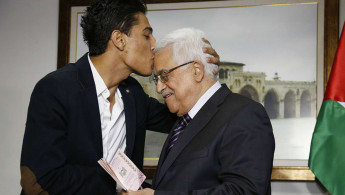The Arab world's obsession with reality TV
One thing the West doesn't know about the Arab world is our obsession with reality TV. We have our versions of Star Academy, American Idol and we even had Big Brother at one point.
It's really fascinating to see people, still, committed to voting for such programmes - even amid the wildest and craziest days of the Arab Spring and the chaos that erupted after.
Unlike in America, the winners of these shows become icons, heros, someone who has to carry the flag of his country on stage and represent the whole nation. It is not about choosing the "best" voice or the prettiest artists, it's more than that; it carries a strange political weight.
I believe the reason behind this obsession is that people find in reality TV an alternative outlet, where they can engage in practices they can't perform in the political sphere.
Arabs use reality TV to voice opposition, disagree, engage in debate, and finally vote - or choose not to vote. Watching reality TV is a form of political participation.
For my generation in Syria, voting for reality TV stars was the only time in our lives when we were able to vote and feel that our vote mattered. It was the only time I was able to vote.
Marwan Kraidy, professor at the University of Pennsylvania, called this process a battle of nationalisms in his book Reality Television and Arab Politics: Contention in Public Life. These contestants are not just competing for a title or a record contract. They are representing their whole country, and the candidates were portrayed as ambassadors.
 |
Arabs use reality TV to voice opposition, disagree, engage in debate, and finally vote |  |
Shaza Hassoun, the Iraqi winner of Star Academy winner in 2007, was given a diplomatic passport after she won.
One news report read: "Shaza did what no politician did, uniting the Iraqis to agree on one person." Hassoun, who became an icon after her victory, was able to unite a divided Iraq, and no one asked if she was Sunni or Shia.
| Read more: Kurd Idol - Can the sound of music drown Kurdish sorrows? |
Her victory was also particularly important in Iraq, which was witnessing some of the highest levels of sectarian conflict the country had ever experienced following the 2003 US-led invasion.
The fact that she was able to garner enough support from a divided Iraq points to the fluidity of sectarian identities and also demonstrates how these competitions can function as spectacles of national reconciliation - even though the material effects may be limited.
This political gravity to such shows also explains why, when a candidate doesn't carry the flag of their country after the announcement, the public will freak out for days. When a Syrian contestant won Arab Idol in 2014, and he did not carry any flag (neither the one representing the uprising nor the government), Syrians on both sides of the conflict, go crazy on social media.
The ongoing brutal civil war did not distract Syrians from following their beloved TV shows.
 |
Voting for the Syrian contestant, Roida Atyeh, was my only voting experience in my 26 years |  |
However, in other contexts, competing nationalisms can contribute to long-standing violent rivalries - especially in the Syrian-Lebanese case.
When Lebanon's Melhem Zien came third in Super Star, protests erupted on the streets - with many demonstrators claiming the Syrian intelligence agencies must have manipulated the Lebanese TV channels to favour the Syrian contestant.
Although these demonstrations had limited impact, they indicate that, in contexts of political repression, these virtual outlets are some of the few spaces where people express their political grievances.
The lack of space for political expression within overarching structures of political repression, is, in my opinion, the principal reason behind this obsession with reality TV. Ordinary people for once feel like their voices matter and their votes count - which of course favoured for both cellphone companies and the show's producers, who make tremendous profits.
On a more personal note, voting for the Syrian contestant, Roida Atyeh, was my only voting experience in my 26 years.
I was one of those who voted and cried when the Syrian contestant lost to the Jordanian contestant - in turn succumbing to these competing nationalisms.
Loubna Mrie is a Syrian activist who participated in the initial stages of the revolution. She later became a photojournalist with Reuters where she covered the ongoing conflict.
She is currently based in New York City where she is a researcher and commentator on Syrian and Middle Eastern affairs and is completing an MA at NYU. Her work has been published in major outlets including the Washington Post, Foreign Affairs, Foreign Policy, and New Republic.
Follow her on Twitter: @loubnamrie
Opinions expressed in this article remain those of the author and do not necessarily represent those of The New Arab, its editorial board or staff.



